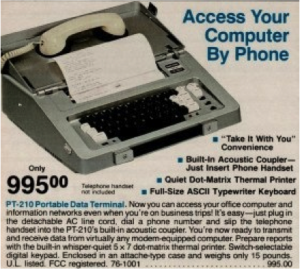Interview with Bob Van Hook & Jackie Eder-Van Hook, Transition Management Consulting: “Virtually” Everything Has Changed in the Past Two Decades
November 11th, 2014
Written by: TPO
This interview is part of a yearlong retrospective blog series commemorating TPO@20!—TPO’s 20th Birthday. These conversations with TPO partners, clients and executives focus on what has and hasn’t changed in “how we work” over the last two decades—and what we can learn for the next 20 years. This interview is with Bob Van Hook (Chief Transition Evangelist & Co-Founder) and Jackie Eder-Van Hook (President & Co-Founder) of Transition Management Consulting—a longtime TPO partner.
TPO: Greetings and thanks for taking time to chat! Let’s start with the basics. What do you do?
Jackie Eder-Van Hook: TMC helps associations and non-profits get the most from their executive successions by providing interim executives, executive succession and transition planning, and executive search. We have about 20 consultants around the country who provide interim executive services.
Bob Van Hook: This year, I got a new title, chief transition evangelist. I talk to clients and bring them into the system. Jackie runs TMC.
Jackie Eder-Van Hook: Bob and I started TMC in 2000 as equal partners. I now have the lead role in client engagement and management, and, as Bob said, running TMC. I also spend time with consultants to improve service delivery and quality control and serve as a sounding board for them.
Bob Van Hook: We spend a lot of time bringing our consultants into the fold and going through a rigorous vetting process to make sure they are wonderful people who do terrific work.
TPO: What were you doing in 1994?
Bob Van Hook: I don’t remember–I’m too young! Jackie and I met in ’93 when we were both working on the Clinton version of health care reform. We were licking our wounds because the plan had failed.
Jackie Eder-Van Hook: Actually, 1994 was one of our favorite years because that’s when Bob and I got together. The next 6 years were instrumental in us coming together as a couple, which led to us being business partners and working together on a daily basis.
 TPO: In 1994, Netscape introduced the browser and America Online provided Internet access. Do you remember the first thing you did on the World Wide Web?
TPO: In 1994, Netscape introduced the browser and America Online provided Internet access. Do you remember the first thing you did on the World Wide Web?
JEVH: I don’t remember my first time on Internet, but I do remember learning the fundamentals of Basic and Fortran programming in college. I decided computers were really cool but programming was not for me. I went to work for my brother, a lawyer and computer geek. He had an early Kaypro portable (or luggable at 30 pounds) computer, about the size of small microwave oven. On my first day, he said here’s a document. Just add this information to it. I spent all day doing it. Then I turned off the computer. My brother asked, “Did you save it?” I said, “What do you mean?” The next day I had to start all over again. That was my introduction to magnetic media.
BVH: And now she saves frequently, believe me. I got my first computer in ’83—an Apple II. In the early ‘80’s I was actually carrying around a Radio Shack dumb terminal and setting up networks for my board of directors. People laughed–here’s that crazy geek trying to hook people up. The problem was a lot of directors were rural. We quickly discovered that the dial-up line was a party line. If someone on the party line picked up his or her phone, our board member would lose the connection. By 1994, I was an early Netscape adopter—I was very happy. I didn’t like AOL—it was too proprietary. With Netscape, I could use the Internet to research health care policy issues like community rating and risk pools. Netscape was very helpful.
 TPO: In terms of changes in your industry that have had a significant impact on “how you work,” what’s the first thing that comes to mind?
TPO: In terms of changes in your industry that have had a significant impact on “how you work,” what’s the first thing that comes to mind?
JEVH: Mobile computing. It doesn’t matter where we live or work. We are truly virtual and can serve our clients from anywhere. Mobile computing allowed us to move from Washington, DC to be closer to my family.
TPO: Overall, has the increase in real-time, always-on communications been a good thing–or not so good?
BVH: I’m inclined to be digital guy. It’s so amazing how easy it is to keep in touch with people. The communication you can do isn’t always meaningful, but it beats not having any communication. I just got an email from someone who worked for me in mid ‘80’s who now lives in Turkey. It is wonderful to be able to catch up electronically through email, text, Facebook, blogs, tweets, and Skype.
JEVH: It’s a positive for us. It really suits our personality. We both like to find connections between things, and it gives us the ability to connect people and ideas. We do a lot of networking, and we enjoy putting people together. It’s how we make meaning in our lives. It’s our hobby, and it’s fun. And the technology makes that possible. Before it was a slower process. You had to call, meet for lunch. Today I might have a piece of information I think someone needs; I can get it to him or her immediately.
BVH: I love to go exploring on the Web. It’s like taking an intellectual trip on the computer. I start bouncing from site to site–finding what interests me. For example, we have a client meeting in Germany—so I’ll be busy looking for AirBNB lodging and checking out what events are nearby.
TPO: Thinking back 20 years, what was your definition of Human Resources then and what is it now?
BVH: I was working in smaller organizations without formal HR roles. HR was basically hiring people and keeping records. Before ’94 I just don’t even remember thinking much about HR. Only about 10 years ago I realized HR should be at the senior staff table. And in my experience, it’s helpful for them to be there. Two things that happened while I was doing interim engagements demonstrate the importance of HR. An employee brought an unfounded claim against the association, and TPO was there to advise us about how to handle it. We were able to use TPO to resolve it. The advisor from TPO was an HR professional HR—a role we did not have on staff. When I was interim CFO at another association, I learned the value of having the HR director at the table—truly a part of the senior team. It’s really important to have someone in constant touch with the people part of operation—someone who works all across the organization.
JEVH: I have a long background in organizational development—a couple degrees in the field. So it is near and dear to my heart. Twenty years ago, HR was transactional and silo-ed. Today, it’s strategic and contributes mightily to an organization’s mission and bottom line.
TPO: What was the definition of leadership? Has it changed?
JEVH: Twenty years ago, leadership was definitely hierarchical—it was about command and control. With many people I worked with, it was the hub and spoke, with the leader at the center of universe. What’s changed for me as a leader? I see things as much more collaborative—more like a network. Who can get the job done best vs. who has the title? The former is far more important at this point in my life than in the past. Providing temporary leadership and using interim executives is a change as well. It calls into question how leadership is delivered, when and by whom. It is an exciting time.
BVH: As someone who enjoyed being at the center of the hub, I can tell you that leadership has changed. I was too much of a wonk to like command and control. There are so many new models that are more organic—where you find networked relationships within an organization and less hierarchy. The best companies are the ones paying attention to their people and keeping them happy. New types of leaders can ask different questions and see from different perspectives. This, too, is the value of professional interim executives.
TPO: Name something else about “how we work” that’s changed in the last two decades.
BVH: The rise and acceptance of interim executives. In 2000, we were writing a business plan. We did a Google search for “interim executive” and received virtually no relevant hits. Now if you do the same search you see thousands of hits.
JEVH: The interim executive field is only about 20 years old. Back then, it wasn’t as acceptable. It’s only really taken off in last 10 to 15 years. There’s still a lot of education to be done on the usefulness of interim executive.
TPO: How about something that hasn’t changed?
JEVH: You still need to have a commitment to self-awareness–to never stop growing. That is as important as ever.
BVH: In the association world, it’s as critical to deal effectively with volunteer boards of directors. The relationship between the Executive Director or CEO and the Board of Directors has to be maintained, sustained and nourished.
What impact has TPO had on your business?
JEVH: Our clients have had positive experiences with TPO because of the care, attention and excellent service TPO has provided at an affordable price.
BVH: In my CEO engagements I always made sure I had an HR expert at the table. If the organization was large enough, we hired. Otherwise we brought in TPO. Even if you have fewer than 50 employees, you have to do certain HR things well or you’re going to get in trouble. We go into organizations and look at HR records and often find that they are a mess. So we call someone like TPO to straighten it out. We’ve had a good relationship with TPO over the years. They’ve come through for our clients when we needed them.
TPO: Bob and Jackie, thank you so much for helping TPO celebrate its 20th birthday.
BVH: You’re quite welcome.
JEVH: It’s been a pleasure. Happy birthday TPO! Wishing you 20 more years!


Leave a Reply